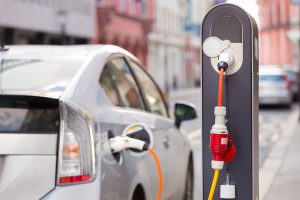As reported by the Bangkok Post, earlier this month Thai oil and gas giant PTT entered a joint venture agreement with Hozon, a Chinese electric vehicle (EV) company. This follows on the heels of another partnership with electronics company Foxconn in September. PTT previously said it plans to invest $1 to $2 billion in EV production over the next six years, with a goal of producing 50,000 electric vehicles annually. Now we know who some of its key partners will be.
As I have previously written, since Thailand became a net importer of fossil fuels several years ago we have seen real momentum from the country’s politico-business class in supporting a transition to cleaner energy. They have been adding renewables like solar to the grid at a fast clip, and now PTT has unveiled important details on its EV ambitions.
To understand why this is a big deal, you need to know a little bit about PTT. It’s 51 percent owned by the Ministry of Finance, and has historically controlled Thailand’s supply of natural gas through its operation of the national pipeline. It also holds a dominant share in the retail market for petroleum products, such as gasoline and diesel. It is an immensely profitable, and therefore powerful, company. According to the 2019 Annual Report, PTT paid over $2 billion to the state in the form of dividends and taxes.
That same year the company booked 2.2 trillion Thai baht in revenue, equal to 73 percent of the government’s entire 2019 budget. And nearly all of that revenue comes from fossil fuels. Not only does PTT operate the national gas pipeline, but is also procures, refines, transmits, trades, and sells oil and gas products. That is the foundation of its entire business.
We have to ask ourselves a very obvious question here. Why would PTT be investing billions in electric vehicles, which directly compete with its bread-and-butter business areas, and will ultimately lower the demand for refined petroleum products? Doing so cuts into one of its major revenue sources. The answer snaps into sharper focus if we look at the changing nature of PTT and Thailand’s energy balance.
Back in 2001, PTT imported 21 percent of Thailand’s natural gas supply and sourced the other 79 percent from domestic producers. In that same year, Thailand imported about 86 percent of its crude oil, but almost all of it was processed in local refineries. Of the finished petroleum products sold in Thailand in 2001, only 1 percent were imported. Even though it had to import most of its crude, PTT still had a measure of control over the retail market because they could refine it locally. Moreover, natural gas reserves were still abundant back then.
Skip forward to 2019, and the picture has changed quite a bit. With domestic production peaking several years ago PTT had to procure 30 percent of its natural gas supply through imports. Not only have these gas imports increased in percentage terms, but because Thailand’s overall energy demand is much higher now (and the grid relies heavily on natural gas) the absolute value of these gas imports is growing bigger every year. Imports of finished petroleum products have also been increasing, from 1 percent in 2001 to 9 percent in 2019. Most importantly, this is not a situation that can be reversed. Ballooning energy imports are going to be a fact of life for Thailand going forward, and they cannot control the prices which will be set on global markets.
PTT, to its credit, sees the writing on the wall and is leaning into it rather than burying its head in the sand. In the future, they will have to keep importing more natural gas, more crude oil, and more refined petroleum products – unless they can develop a home-grown alternative, such as electric vehicles that can tap a grid powered by a growing share of renewable energy sources. That is why you see PTT throwing its weight behind EV production. Not only does it align with Thailand’s overall industrial strategy to be a regional auto manufacturing hub, but it can help solve some of PTT’s (and Thailand’s) longer term energy security issues.
It likely won’t be a smooth transition. PTT is a multi-billion-dollar behemoth entirely structured around the exploration, processing, and trading of fossil fuels. Making cleaner energy the backbone of its operations will be disruptive, expensive, and politically perilous as Thai consumers may have to bear higher prices in the short term. But if they do it right, they will come out the other end better insulated from long-term price shocks tied to the global supply of fossil fuels, and perhaps be on the cutting edge of a booming EV industry. In any case, whether they want to or not, they don’t have many other options at this point.

































